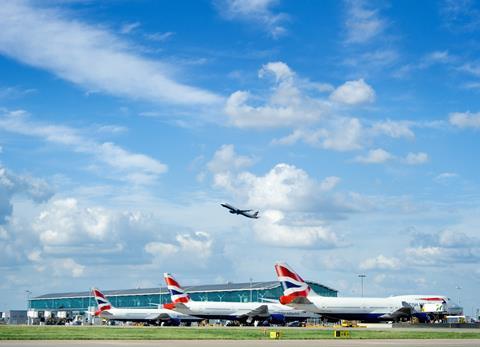UK regulators are proposing a sliding scale of charges for airlines at London Heathrow Airport under which the price cap will fall on average 6% annually over the coming five years in line with increased traffic.
The UK Civil Aviation Authority is proposing the average maximum price per passenger that airlines will pay Heathrow will fall from £30.19 ($37.07) today to £26.31 in 2026.

Heathrow Airport had proposed charges to be set at £41.95 as it sought to recover losses incurred during the pandemic, arguing regulation of the fees means its profits are capped during good times but unlimited during downturns such as the pandemic. Airlines have been sharply critical of Heathrow’s proposed charges, pressing for lower levels to support traffic recovery.
In an interim decision the CAA had already raised the airport charge cap from £22 ($29) to £29.50 at 2020 levels – though in practice the charge will be £30.19 after inflation – for this year to reflect the pandemic challenges facing the airport. However it delayed a longer-term decision amid uncertainty over the speed of the traffic recovery from the pandemic.
In issuing its final proposals today it says the charges reflect expected increases in passenger numbers as the recovery takes hold and the higher level of the price cap for 2022.
”While passenger numbers are expected to continue to recover in 2022 and into 2023, the proposals include new mechanisms to deal with the remaining uncertainty in respect of passenger numbers,” it says, adding it has set expectations for the ”appropriate level of efficiency to expect” from the airport operator and an ”appropriate return for capital providers” to ensure it can efficiently finance its regulated activities.
CAA chief executive Richard Moriarty says: ”We have listened very carefully to both Heathrow Airport and the airlines who have differing views to each other about the future level of charges. Our independent and impartial analysis balances affordable charges for consumers, while allowing Heathrow to make the investment needed for the future.”
Heathrow Airport chief executive John Holland-Kaye argues the CAA ”continues to underestimate” what it takes to deliver a good passenger service, in terms the level of investment and operating costs required and the ”fair incentive needed” for private investors to finance it.
”Uncorrected, these elements of the CAA’s proposal will only result in passengers getting a worse experience at Heathrow as investment in service dries up.
“Economic regulation should drive affordable private investment in Britain’s infrastructure to the benefit of users, not hamper it. The CAA’s proposal will undermine the delivery of key improvements for passengers, while also raising serious questions about Britain’s attractiveness to private investors,” he says.
Virgin Atlantic chief executive Shai Weiss, one of Heathrow’s biggest operators, describes the proposals as a positive step but calls for a further reduction.
“The regulator can and must go further to lower the cap beyond the proposed average of £28.39, adjusted for inflation, up to the end of 2026, reflecting robust demand for travel this summer and beyond,” he says.
“With travel recovery underway, our collective focus should be on upholding the best possible experience for customers with fair charges, especially with consumers facing cost of living pressures and our Global Britain aspirations at stake.
”Along with the industry community, we’ll respond to the CAA’s consultation with the data that supports a further reduction, while reserving the option to appeal to the Competition & Markets Authority, so that passengers are protected and the CAA’s duties are fulfilled. Weiss says.
IATA director general Willie Walsh, a fierce critic of the proposed charges at Heathrow, calls the CAA move ”two steps back and eventually one step forward”.
He adds: ”While it’s good that charges will slightly fall in the long term, the reality is that the UK’s competitiveness, passengers and airlines need help now. And right now, charges are initially going up by a staggering 56% compared to 2021. This is based on false assumptions that are already being proven wrong by the strong post-pandemic demand for travel.”


























